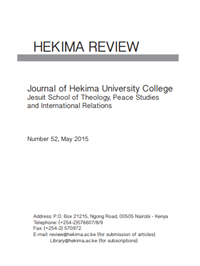Transitional Justice and the Hermeneutics of Reconciliation in Burundi: Challenges and Prospects for Evangelization
Keywords:
Transitional JusticeAbstract
The concept of transitional justice has often been associated with Truth and Reconciliation Commissions and related themes of justice, accountability, forgiveness, amnesty, forgetfulness and reconciliation. In Burundi, a small country situated in the Great Lakes Region (28 734 square km) between Rwanda (North), Tanzania (East) and DRC (West), the question of transitional justice is pertinent because of the many wars that the country experienced since its independence (1965, 1972, 1988, 1991 and 1993-2008). These wars were between the two main ethnic groups in Burundi, the Hutu and the Tutsi. The accumulation of violence and impunity over the years resulted in almost two decades of civil war between the government (largely of Tutsi obedience) and rebel groups (mostly Hutu) from 1994 to 2008. The conclusion of peace agreements between Burundians insisted on the necessity to implement transitional justice mechanisms to deal with past human rights violations and to build a common future. This paper underscores the context and purpose
of transitional justice mechanisms in Burundi, especially the Truth and Reconciliation Commission established in December 2014 and how best they can be implemented today. It also examines the challenges related to these mechanisms and how they could be transformed into opportunities for evangelization.
Downloads
Downloads
Published
Issue
Section
License
Copyright (c) 2024 Hekima Review

This work is licensed under a Creative Commons Attribution-ShareAlike 4.0 International License.


